- Home
- Jr. Horatio Alger
Young Captain Jack; Or, The Son of a Soldier Page 2
Young Captain Jack; Or, The Son of a Soldier Read online
Page 2
CHAPTER I.
THE ENCOUNTER ON THE BRIDGE.
"Get out of the way, boy, or I'll ride over you!"
"Wait a second, please, until I haul in this fish. He's such a beauty Idon't wish to lose him."
"Do you suppose I'm going to bother with your fish? Get out of the way,I say!" And the man, who sat astride of a coal-black horse, shook hishand threateningly. He was dressed in the uniform of a surgeon in theConfederate Army, and his face was dark and crafty.
The boy, who was but fourteen and rather slenderly built, looked up insurprise. He was seated on the side of a narrow bridge spanning amountain stream flowing into the ocean, and near him rested a baskethalf-filled with fish. He had been on the point of hauling in anotherfish--of extra size--but now his prize gave a sudden flip anddisappeared from view.
"Gone! and you made me miss him!" he cried, much vexed.
"Shut up about your fish and get out of the way!" stormed the man on thehorse. "Am I to be held up here all day by a mere boy?"
"Excuse me, but I have as much right on this bridge as you," answeredthe boy, looking the man straight in the eyes.
"Have you indeed?"
"I have."
"Perhaps you think yourself of just as much importance as a surgeon inthe army, on an important mission."
"I didn't say that. I said I had just as much right on this bridge asyou. It's a public bridge."
"Bah! get out of the way and let me pass. I've wasted time enough onyou." The man tugged nervously at his heavy mustache. "Which is the wayto Tanner's Mill?"
To this the youth made no reply. Gathering up his fishing rod and hisbasket, he stepped to the river bank and prepared to make another castinto the water.
"I say, tell me the way to Tanner's Mill," repeated the man.
"I reckon you had better go elsewhere for your information," returnedthe boy quietly, but with a faint smile playing over his handsome,sunburned face.
"What, you young rascal, you won't tell me?" stormed the man.
"No, I won't. And I beg to let you know I am no rascal."
"You are a rascal," was the snappy reply. "Answer my question, or itwill be the worse for you," and now the man leaped to the ground andadvanced with clenched fists. Possibly he thought the youth wouldretreat; if so, he was mistaken.
"Don't you dare to touch me, sir. I am not your slave."
"You'll answer my question."
"I will not."
"Why not?"
"Because you haven't treated me decently; that's why."
"You hold a mighty big opinion of yourself."
"If I do, that's my own business."
"Perhaps you are a Northern mudsill."
"No, I am just as loyal to the South as you or anybody."
"I wouldn't care to take your word on that point, youngster. I am on animportant mission, and if you sympathize with our South in this greatwar you'll direct me to the short way to Tanner's Mill."
"Do they expect a fight at Tanner's Mill?"
"Don't bother me with questions. Show me the road, and I'll be off."
"Keep to the right and you'll be right," answered the youth, after apause, and then he resumed his fishing.
The man scowled darkly as he leaped again into the saddle. "How I wouldlove to warm you--if I had time," he muttered, then put spurs to hissteed and galloped off.
"So he is going to Tanner's Mill," mused the boy, when left alone. "Ifthey have a fight there it will be getting pretty close to home. I don'tbelieve mother will like that."
As will be surmised from the scene just described, Jack Ruthven was amanly, self-reliant boy, not easily intimidated by those who wouldbrowbeat him.
He lived in a large mansion, set back some distance from the river, uponwhat was considered at that time one of the richest plantations in SouthCarolina.
Mrs. Ruthven was a widow, having lost her husband, Colonel MartinRuthven, at the bloody battle of Gettysburg. She had one daughter,Marion, a beautiful young lady of seventeen. Marion and Jack thought theworld of each other and were all but inseparable.
The sudden taking-off of the colonel had proved a great shock both tothe children and to Mrs. Ruthven, and for a long time the lady of thehouse had lain on a bed of sickness, in consequence.
She was now around, but still weak and pale. Her one consolation was thechildren, and she clung to them closer than ever.
On several occasions Jack had spoken of enlisting as a drummer boy, butMrs. Ruthven would not listen to it.
"No, no, Jack! I cannot spare you!" had been her words. "One gone out ofthe family is enough."
And Marion, too, had clung to him, so that going away became almost animpossibility, although he longed for the glories of a soldier's life,with never a thought of all the hardships and sufferings such a lifeentails.
The meeting with the Confederate surgeon had filled Jack's head oncemore with visions of army life, and as he continued to fish he forgotall about the unpleasant encounter, although he remembered thatrepulsive face well. He was destined to meet the surgeon again, andunder most disagreeable circumstances.
"I wish mother would let me join the army," he thought, after hauling inanother fish. "I am sure our regiments need all the men they can get.Somehow, we seem to be getting the worst of the fighting lately. Iwonder what would happen if the South should be beaten in thisstruggle?"
Ten minutes passed, when a merry whistle was heard on the road andanother boy appeared, of about Jack's age.
"Hullo, Darcy!" cried Jack. "Come to help me fish?"
"I didn't know you were fishing," answered Darcy Gilbert, a youth wholived on the plantation next to Jack. "Are you having good luck?"
"First-rate. I was getting ready to go home, but now you have come I'llstay a while longer."
"Do, Jack; I hate to fish alone. But I say, Jack----" And then Darcybroke off short.
"What were you going to say?"
"Oh, nothing!"
There was a minute of silence, during which Darcy baited his hook andthrew it in.
"You look as if you had something on your mind. Darcy," went on Jack,after his friend had brought in a fine haul apparently withoutappreciating the sport. "Did you meet a Confederate surgeon on theroad?"
"No, I came across the plantation. What of him?"
"He came this way, and we got into a regular row because I wouldn'tclear right out and give him the whole of the bridge."
"He didn't hit you, did he?"
"Not much! If he had I would have pitched into him, I can tell you, bigas he was!" And Jack's eyes flashed in a way that proved he meant whathe said.
"No, I didn't meet him, but I met St. John Ruthven, your cousin. Jack,do you know that that young man is a regular bully, even if he is adandy?"
"Yes, I know it, Darcy."
"And he is down on you."
"I know that too. But why he dislikes me I don't know, excepting that Idon't like to see him paying his addresses to my sister Marion. Marionis too good for such a man."
"Is he paying his addresses to her?"
"Well, he is with her every chance he can get."
"Does Marion like him?"
"Oh! I reckon she does in a way. He is always so nice to her--much nicerthan he has ever been to me."
"Has he ever spoken to you about yourself?" went on Darcy Gilbert, witha peculiar look at Jack.
"Oh, yes! often."
"I mean about--well, about your past?" went on Darcy, with someconfusion.
"My past, Darcy? What is wrong about my past?"
"Nothing, I hope. But I didn't like what St. John Ruthven said aboutyou."
"But what did he say?"
"I don't know as I ought to tell you. I didn't believe him."
"But I want to know what he did say?" demanded Jack, throwing down hisfishing pole and coming up close to his friend.
"Well, if you must know, Jack, he said you were a nobody, that youdidn't belong to the Ruthven family at all, and that you would have togo away some d
ay," was the answer, which filled Jack with consternation.

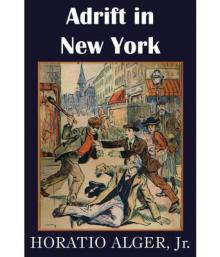 Adrift in New York: Tom and Florence Braving the World
Adrift in New York: Tom and Florence Braving the World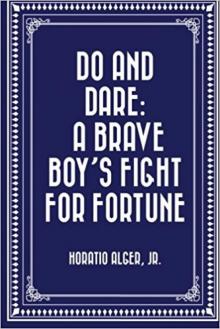 Do and Dare — a Brave Boy's Fight for Fortune
Do and Dare — a Brave Boy's Fight for Fortune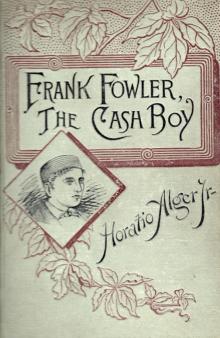 The Cash Boy
The Cash Boy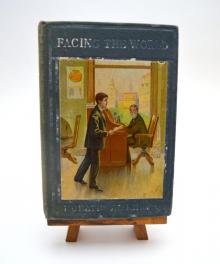 Facing the World
Facing the World The Young Explorer; Or, Claiming His Fortune
The Young Explorer; Or, Claiming His Fortune The Store Boy
The Store Boy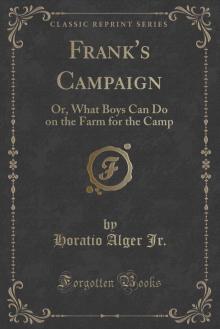 Frank's Campaign; Or, The Farm and the Camp
Frank's Campaign; Or, The Farm and the Camp Cast Upon the Breakers
Cast Upon the Breakers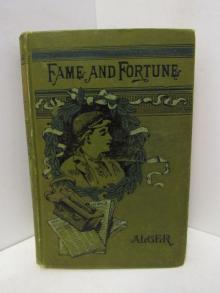 Fame and Fortune; or, The Progress of Richard Hunter
Fame and Fortune; or, The Progress of Richard Hunter The Errand Boy; Or, How Phil Brent Won Success
The Errand Boy; Or, How Phil Brent Won Success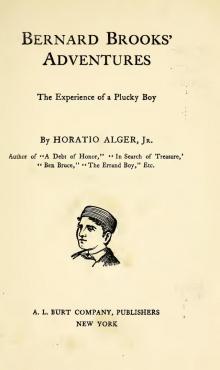 Bernard Brooks' Adventures: The Experience of a Plucky Boy
Bernard Brooks' Adventures: The Experience of a Plucky Boy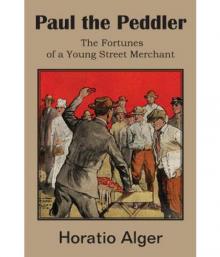 Paul the Peddler; Or, The Fortunes of a Young Street Merchant
Paul the Peddler; Or, The Fortunes of a Young Street Merchant Brave and Bold; Or, The Fortunes of Robert Rushton
Brave and Bold; Or, The Fortunes of Robert Rushton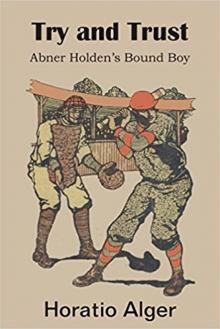 Try and Trust; Or, Abner Holden's Bound Boy
Try and Trust; Or, Abner Holden's Bound Boy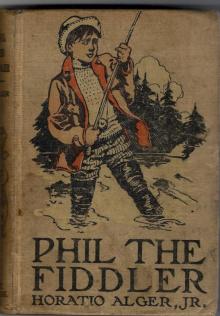 Phil, the Fiddler
Phil, the Fiddler In A New World; or, Among The Gold Fields Of Australia
In A New World; or, Among The Gold Fields Of Australia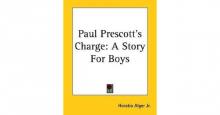 Paul Prescott's Charge
Paul Prescott's Charge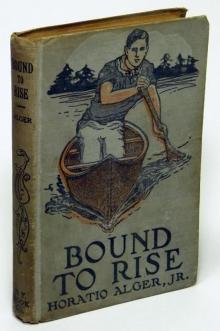 Joe's Luck; Or, Always Wide Awake
Joe's Luck; Or, Always Wide Awake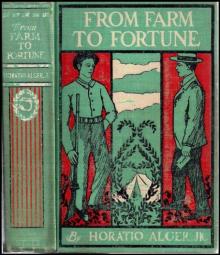 From Farm to Fortune; or, Nat Nason's Strange Experience
From Farm to Fortune; or, Nat Nason's Strange Experience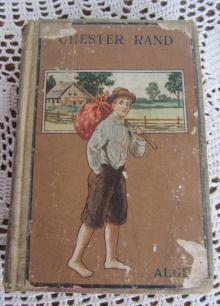 Chester Rand; or, The New Path to Fortune
Chester Rand; or, The New Path to Fortune Driven from Home; Or, Carl Crawford's Experience
Driven from Home; Or, Carl Crawford's Experience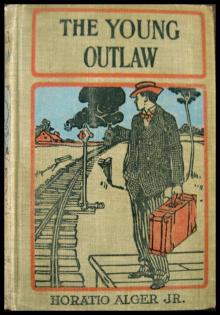 The Young Outlaw; or, Adrift in the Streets
The Young Outlaw; or, Adrift in the Streets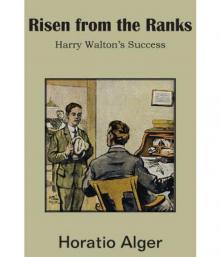 Risen from the Ranks; Or, Harry Walton's Success
Risen from the Ranks; Or, Harry Walton's Success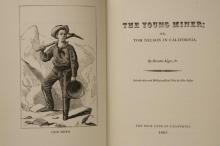 The Young Miner; Or, Tom Nelson in California
The Young Miner; Or, Tom Nelson in California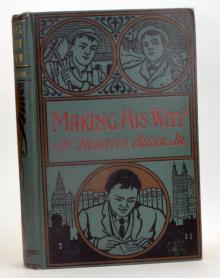 Making His Way; Or, Frank Courtney's Struggle Upward
Making His Way; Or, Frank Courtney's Struggle Upward Ben, the Luggage Boy; Or, Among the Wharves
Ben, the Luggage Boy; Or, Among the Wharves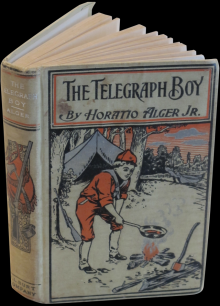 The Telegraph Boy
The Telegraph Boy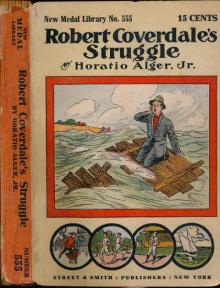 Robert Coverdale's Struggle; Or, on the Wave of Success
Robert Coverdale's Struggle; Or, on the Wave of Success Rufus and Rose; Or, The Fortunes of Rough and Ready
Rufus and Rose; Or, The Fortunes of Rough and Ready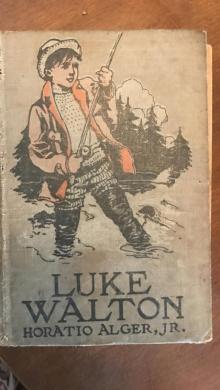 Luke Walton
Luke Walton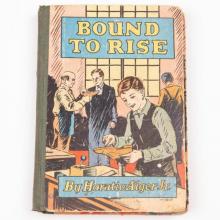 Mark Mason's Victory: The Trials and Triumphs of a Telegraph Boy
Mark Mason's Victory: The Trials and Triumphs of a Telegraph Boy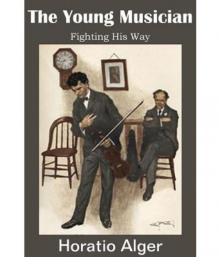 The Young Musician; Or, Fighting His Way
The Young Musician; Or, Fighting His Way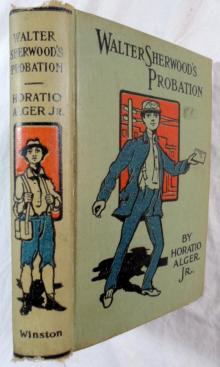 Walter Sherwood's Probation
Walter Sherwood's Probation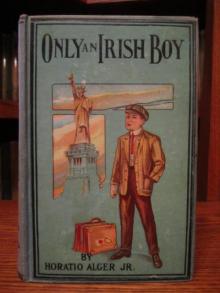 Only an Irish Boy; Or, Andy Burke's Fortunes
Only an Irish Boy; Or, Andy Burke's Fortunes Slow and Sure: The Story of Paul Hoffman the Young Street-Merchant
Slow and Sure: The Story of Paul Hoffman the Young Street-Merchant Herbert Carter's Legacy; Or, the Inventor's Son
Herbert Carter's Legacy; Or, the Inventor's Son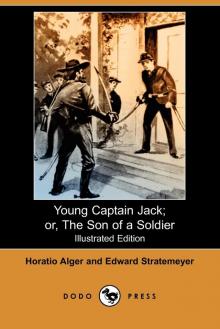 Young Captain Jack; Or, The Son of a Soldier
Young Captain Jack; Or, The Son of a Soldier Timothy Crump's Ward: A Story of American Life
Timothy Crump's Ward: A Story of American Life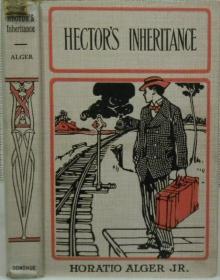 Hector's Inheritance, Or, the Boys of Smith Institute
Hector's Inheritance, Or, the Boys of Smith Institute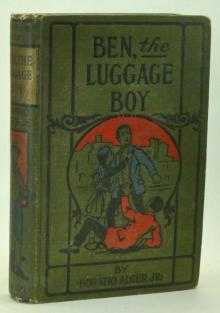 Ben's Nugget; Or, A Boy's Search For Fortune
Ben's Nugget; Or, A Boy's Search For Fortune